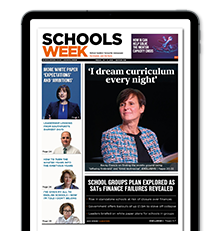A reading target is right. Here’s how schools can make it happen
- Log in
- Subscribe
Four years ago, we set ourselves a network-wide goal: by 2028, 90 per cent of children in every Lift primary school would pass the phonics check.
We also committed that 90 per cent would be reading at or above their expected age – and that every pupil from Year 2 to Year 10 would be tested annually to track progress.
Alongside 90 per cent measures for end-of-primary and GCSE outcomes, these reading goals form what we call Lift490.
They represent a bold, ambitious, never-been-done-before set of goals that have raised both the bar and our collective expectations across Lift Schools.
‘Relentless determination’
This level of ambition demands more of us as professionals. It requires precision, tenacity and a relentless determination to do more for the children and young people we serve.
That’s why I was so encouraged to hear the Secretary of State echo this same challenge at a national level, setting a target for 90 per cent of children to pass the phonics check and introducing a new statutory reading test for Year 8 pupils.
The ambition is right.
But it will only be achieved through the kind of system-wide focus, persistence and collaboration that we have been building through Lift490.
With several years of experience behind us, I can say with complete confidence that Lift490 has been a galvanising force.
It has provided clarity of purpose, built professional alignment and created a shared belief that every child can succeed.
When you measure rigorously, intervene intelligently and keep expectations high, the gains will come
It has kept reading at the centre of our mission and has given schools the tools and data they need to drive improvement with confidence.
Reading is the key that unlocks everything – learning, engagement and opportunity. Ensuring that children are able to read well should be the absolute baseline for every school.
And where pupils need help, that help must be swift, targeted and consistent. Reading isn’t just the work of primary schools; it’s everyone’s responsibility.
But it’s also about joy. Reading opens up worlds of imagination, empathy and discovery.
‘Time, focus and belief’
Our ambition is not only that children read fluently, but that they want to read, that reading truly belongs to them and can take them wherever they want to go.
Books introduce new perspectives, new vocabulary and new ways of thinking. They build empathy and understanding, helping young people make sense of themselves and the world around them.
When we first assessed 24,000 pupils in 2021, only 58 per cent of Key Stage 3 students were secure readers.
That figure was sobering; but it gave us the clarity we needed.
By the following summer, the proportion had risen to 65 per cent, and by 2025 it reached 72 per cent. These are not abstract numbers; they represent thousands of young people who can now access the curriculum, participate fully in school life and read with confidence for pleasure as well as purpose.
The most striking gains have been in schools with high proportions of disadvantaged white working-class pupils: nine percentage points up at Unity City in Middlesbrough, and ten at Clacton in Essex.
In both cases, progress has been driven by clear leadership, high expectations and a whole-school approach that doesn’t rely on a single reading lead but unites every adult around the same goal.
This transformation has taken time, focus and belief. But the principle is simple: when you measure rigorously, intervene intelligently and keep expectations high, the gains will come.
As a nation, we should share that same conviction. A collective focus on reading isn’t just about raising scores – it’s about unlocking doors. Every child who can read securely has a stronger chance of success in education and in life. That is a goal worth every ounce of effort.
Continue the conversation, share this article on social media
Join the conversation belowLatest education roles from

Group Director of Governance & Company Secretary
New City College
View job
Principal (Harrow College) – HRUC
FEA
View job
Deputy Director of Apprenticeships
Manchester Metropolitan University
View job
Independent Non- Executive Director (INED)
League Football Education
View jobSponsored posts
Sponsored post Sponsored
Sponsored
Retire Early, Live Fully: What Teachers Need to Consider First
Specialist Financial Adviser, William Adams, from Wesleyan Financial Services discusses what teachers should be considering when it comes to...
SWAdvertorial 1wSWAdvertorial
1w Sponsored post Sponsored
Sponsored
AI Safety: From DfE Guidance to Classroom Confidence
Darren Coxon, edtech consultant and AI education specialist, working with The National College, explores the DfE’s expectations for AI...
SWAdvertorial 2wSWAdvertorial
2w Sponsored post Sponsored
Sponsored
How accurate spend information is helping schools identify savings
One the biggest issues schools face when it comes to saving money on everyday purchases is a lack of...
SWAdvertorial 3wSWAdvertorial
3w Sponsored post Sponsored
Sponsored
Building Character, Increasing Engagement and Growing Leaders: A Whole School Approach
Research increasingly shows that character education is just as important as academic achievement in shaping pupils’ long-term success. Studies...
SWAdvertorial 1moSWAdvertorial
1moYour thoughts
Leave a Reply Cancel reply

Subscribe
Become a subscriber and stay up to date with the latest breaking news and industry discussion.
Find out more